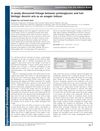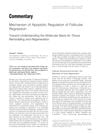54 citations,
December 2011 in “American Journal Of Pathology” A Gsdma3 mutation causes hair loss due to stem cell damage from skin inflammation.
33 citations,
July 2007 in “Journal of cell science” Miz1 is essential for proper hair structure and growth.
 10 citations,
August 2014 in “Experimental Dermatology”
10 citations,
August 2014 in “Experimental Dermatology” Decorin, a protein, may help start hair growth and could be used to treat hair loss.
92 citations,
September 2013 in “Journal of Investigative Dermatology” BMAL1 and Period1 genes can influence human hair growth.
 136 citations,
May 2019 in “Cells”
136 citations,
May 2019 in “Cells” Stem cell therapy, particularly using certain types of cells, shows promise for treating hair loss by stimulating hair growth and development, but more extensive trials are needed to confirm these findings.
 86 citations,
December 2001 in “Experimental dermatology”
86 citations,
December 2001 in “Experimental dermatology” Mutant mice help researchers understand hair growth and related genetic factors.
 75 citations,
August 2018 in “Biochemical pharmacology”
75 citations,
August 2018 in “Biochemical pharmacology” Targeting the skin's endocannabinoid system could help treat skin disorders.
 52 citations,
October 2012 in “Journal of Dermatological Science”
52 citations,
October 2012 in “Journal of Dermatological Science” The document concludes that mouse models are crucial for studying hair biology and that all mutant mice may have hair growth abnormalities that require detailed analysis to identify.
 47 citations,
February 2021 in “Pharmacological research”
47 citations,
February 2021 in “Pharmacological research” Exosomes can improve skin health and offer new treatments for skin repair and rejuvenation.
 18 citations,
November 2020 in “Frontiers in Cell and Developmental Biology”
18 citations,
November 2020 in “Frontiers in Cell and Developmental Biology” Inflammation plays a key role in activating skin stem cells for hair growth and wound healing, but more research is needed to understand how it directs cell behavior.
 10 citations,
May 2020 in “Dermatology Research and Practice”
10 citations,
May 2020 in “Dermatology Research and Practice” Proteoglycans are important for hair growth, and a specific treatment can help reduce hair loss.
 8 citations,
December 2018 in “Journal of Dermatological Treatment”
8 citations,
December 2018 in “Journal of Dermatological Treatment” The PRP-like cosmetic with biomimetic peptides is potentially effective and safe for treating alopecia areata.
 45 citations,
August 2018 in “Stem Cells International”
45 citations,
August 2018 in “Stem Cells International” Stem cells, especially from fat tissue and Wharton's jelly, can potentially regenerate hair follicles and treat hair loss, but more research is needed to perfect the treatment.
3 citations,
July 2023 in “International journal of molecular sciences” Stress may contribute to hair loss in alopecia areata by affecting immune responses and cell death in hair follicles.
 24 citations,
January 2003 in “Journal of Investigative Dermatology”
24 citations,
January 2003 in “Journal of Investigative Dermatology” Blocking a specific receptor slows down hair loss in mice.
 6 citations,
April 2010 in “Journal of Dermatological Science”
6 citations,
April 2010 in “Journal of Dermatological Science” Laminin-511 may help promote hair growth, while laminin-332 does not affect hair loss.
 109 citations,
December 1998 in “The Journal of Dermatology”
109 citations,
December 1998 in “The Journal of Dermatology” Manipulating the catagen and telogen phases of hair growth could lead to treatments for hair disorders.
November 2024 in “Biochemical and Biophysical Research Communications” Abnormal gene expression related to keratin causes hair loss in certain mice.

Ganoderma lucidum extract may help treat stress-related hair loss.
 87 citations,
April 2018 in “Biochemical and Biophysical Research Communications”
87 citations,
April 2018 in “Biochemical and Biophysical Research Communications” Exosomes from dermal papilla cells can help grow hair and might treat hair loss.
11 citations,
May 2022 in “Chinese medicine” Alpinetin helps grow hair by turning on hair stem cells and is safe for use.
 July 2024 in “Frontiers in Pharmacology”
July 2024 in “Frontiers in Pharmacology” Pilose antler extracts help hair growth by activating hair follicle stem cells.
 November 2022 in “The journal of investigative dermatology/Journal of investigative dermatology”
November 2022 in “The journal of investigative dermatology/Journal of investigative dermatology” IL-15 promotes hair growth and protects hair follicles.
 57 citations,
June 2003 in “American Journal of Physiology-cell Physiology”
57 citations,
June 2003 in “American Journal of Physiology-cell Physiology” Cyclosporin A helps mice grow hair by blocking a specific protein activity in skin cells.
 25 citations,
September 2018 in “Scientific Reports”
25 citations,
September 2018 in “Scientific Reports” Morroniside may help hair grow and stay in its growth phase by affecting certain cell signals.
 15 citations,
May 2020 in “BMC complementary medicine and therapies”
15 citations,
May 2020 in “BMC complementary medicine and therapies” Polygonum multiflorum extract helps hair grow longer and fights the effects of hormones that cause hair loss.
5 citations,
January 2021 in “Frontiers in Cell and Developmental Biology” Inhibiting Zyxin may help treat androgenetic alopecia by promoting hair growth.
 2 citations,
January 2022 in “International Journal of Medical Sciences”
2 citations,
January 2022 in “International Journal of Medical Sciences” Kartogenin may help treat hair loss by promoting hair growth and extending the hair growth phase.
 2 citations,
June 2001 in “American Journal of Pathology”
2 citations,
June 2001 in “American Journal of Pathology” The document concludes that understanding how hair follicles naturally die and regenerate is important for insights into organ development and could impact health and disease treatment.
 1 citations,
January 2022 in “Faculty reviews”
1 citations,
January 2022 in “Faculty reviews” The best long-lasting results in treating hair loss may be achieved through combination therapy, including treatments like finasteride, minoxidil, and platelet-rich plasma injections.






















